Why Pretty.Strong. Is Pretty Wrong: The Case Against the LFL
[This is the first of three articles I wrote regarding Oxygen’s reality show on the LFL, Pretty.Strong. For the next installment in the series, read here.]
The Oxygen network, owned by NBC Universal, recently greenlighted a reality series about the Legends Football League, still commonly known as the Lingerie Football League. The reality show, Pretty.Strong., is set to debut on October 6 on Oxygen, part of a bid by the LFL to position itself “as a mainstream sports franchise.”
The fact that Oxygen would get into bed (so to speak) with the Lingerie Football League speaks volumes about the network’s desperation to draw eyeballs at any cost. Yet it’s still stunning that NBC Universal would allow itself to be in any way involved with the promotion of something as seedy as the LFL, particularly considering the checkered history of the league and its CEO, chairman, and dictator-for-life, Mitch Mortaza. Rarely has the phrase “deal with the devil” been more apt.

Pretty.Strong. encourages viewers to “bench your assumptions” about the LFL. Along those lines, here’s an inside look at the history of this so-called sports league. Rest assured, whatever assumptions you may have about lingerie football, the reality is likely far, far worse than anything you imagined.
A Quick History of the LFL
The concept of the LFL began when Mitchell S. Mortaza, then a young marketing executive, created the Lingerie Bowl in 2004. The Lingerie Bowl, a Super Bowl halftime alternative shown on pay-per-view television, featured models and actresses in revealing uniforms playing something loosely resembling indoor football. Mortaza hailed it as “an incredible lingerie fashion show, with red carpet arrivals and more.”
The Lingerie Bowl wasn’t Mitch Mortaza’s first television exposure, however. The Broward Palm Beach New Times described Mortaza’s first brush with television fame:
The slick self-proclaimed millionaire, whose record includes arrests for drunk driving and public intoxication, wasn’t new to lowbrow entertainment. In the late ‘90s, Mortaza appeared on an episode of the show Blind Date. With a neon tan that glared under the high-powered lights and a shirt unbuttoned to his diaphragm, he said his nickname was “Razor” and his biggest turn-on was “toe rings.” He called himself “the king of one-night stands” and told the camera, “I’m not out there lookin’ for nuns.” He showed up for his date wearing a black tank top, a shell necklace, a thumb ring, and a pair of designer sunglasses he didn’t remove all night – even inside the candlelit restaurant.
The first Lingerie Bowl in 2004 drew widespread condemnation; their biggest sponsor, Chrysler Dodge, and the American Foundation for AIDS Research, which was supposed to receive proceeds from the event, both pulled their associations with the Lingerie Bowl after fierce criticism. Still, a gambling site came in to save the day, and it salvaged enough ratings to make it an annual event. Three more planned Lingerie Bowls were eventually cancelled, most notably Lingerie Bowl VI, which was scrubbed when a dispute arose with the Florida nudist colony where the game was to be played.
Undeterred, Mitch Mortaza expanded on his annual publicity stunt and started the ten-team Lingerie Football League (LFL) in the fall of 2009. The concept of the league was and always has been simple – hot women in revealing uniforms playing full-contact football. For some, the LFL became the perfect carnal blend of sex, violence, and something that passes for sports.
A Spectacle, Not a Sport
Lingerie football is not a real sport, obviously, but that’s a point that confuses many otherwise intelligent people. It’s easy to be fooled…after all, the women look athletic, they’re on a football field, they seem to be playing what resembles football. Sure, the uniforms are revealing, but it’s still a sport, right?
Wrong…completely wrong. The LFL has a long history of excluding women who don’t fit the “image” of their league, regardless of talent. Mortaza doesn’t shy away from that reality, saying, “First and foremost, you have to be beautiful. We have to be able to market you.”
Indeed, LFL players are vetted first and foremost by appearance, a fact of which Mortaza and the LFL are very honest (and seemingly proud). The LFL instructs potential recruits to wear “cute gym gear” and bring a headshot of themselves to tryouts, in what is essentially a casting call. Most media sources that glorify LFL players try to ignore the reality that it was only by being chosen in a glorified wet T-shirt contest that they made it into the league in the first place.

“Hey, everybody…I’m trying out for football!”
At the end of the tryout, new recruits are selected – first and foremost – based on their sex appeal (or “marketability,” to borrow Mortaza’s euphemism). But LFL players continue to have their appearances harshly judged on an ongoing basis: players are required to send photos of themselves in bikinis to Mortaza and can be cast aside solely based on how they look in those photos. This creates a torturous environment where women who should be preparing for dangerous, physical contact are instead downing water pills, starving themselves, and resorting to other extreme measures to look skinny enough to fit the league’s image.
Shows like Pretty.Strong. tend to gloss over all this and still treat the LFL like it’s legitimate sport. But it’s an inviolable tenet of sports: When a “sport” rejects female athletes based not on their talent but based – first and foremost – on whether or not a man subjectively thinks she looks sexy in lingerie, it’s not a legitimate competitive sport. No legitimate sports enterprise, anywhere, operates that way.
Mortaza doesn’t apologize for any of this, stating, “We just happen to have an entire league of Tom Brady’s and David Beckham’s and Maria Sharapova’s.” That’s an absurd comparison, of course: Brady, Beckham, and Sharapova are elite athletes in a sport open to everyone, and on top of that, they happen to also have marketable looks. But Tom Brady isn’t the starting quarterback of the New England Patriots because of his sex appeal…if Bill Belichick found a toothless hillbilly who could play quarterback more effectively than Brady, the competitive nature of the NFL would compel Belichick to send Brady to the bench. Because that’s how a real sport operates…with roster spots earned on merit, not on how athletes look in their underwear.
Yes, the women who make it through and become LFL players are often quite athletic and competitive…but that doesn’t make lingerie football a sport, nor does it negate any of the above. The LFL is not sports…like the WWE, it’s a sport-like spectacle with pre-selected, athletic actors. It’s mud-wrestling without the mud. With all due respect to the women of the LFL, a true sports fan simply cannot ignore the existence of women’s football players who are just as committed and far more talented than those in the LFL but who have been blackballed from the league because of Mortaza’s outrageous marketing tactics.
Follow the Money
The single most important thing you need to know about the LFL is that it is a single‑entity league, which means Mitch Mortaza owns not only the league overall but every single team within it. This setup makes Mortaza the league’s supreme decision-maker; he alone has the ability to ban players, fire coaches and staff, cancel games, and even fold entire LFL franchises purely at his discretion. Furthermore, all the money generated by the league goes directly into his pocket. This arrangement clearly creates an environment ripe for abuses of power.
Realizing that he needed to draw attention away from his own questionable behavior, Mortaza cleverly rebranded the league in 2013 and deliberately turned the public focus and emphasis toward the women of the LFL. By essentially hiding behind the female athletes and their dedication, commitment, and all-around good looks, Mortaza hoped to legitimize the LFL in the public’s eyes. Criticism of the LFL was interpreted as somehow demeaning to the women; instead, we are now constantly being told by shows like Pretty.Strong. that we should all support and celebrate these hard-working athletes in their efforts.
The most amusing aspect of that argument is that Mitch Mortaza – who proudly declares that the LFL has always been profitable – doesn’t pay these women a dime. When pressed on the issue, Mortaza declines to disclose his personal salary. But he is a self-proclaimed millionaire who boasts about “his very expensive mortgage up in Hollywood.” One prominent LFL critic, Larry Glicken, has said that Mortaza is like a pimp, exploiting scantily-clad women for personal profit. That’s unfair, of course…pimps pay better. At least, I assume they pay something.

This is Mitch Mortaza. Seriously.
For the past five years, Mortaza has kept LFL players hooked with grand promises that the league will revert back to a compensation model any day now. Several LFL veterans confirmed that the league always makes vague allusions to financial compensation just around the corner. Mortaza suggested to players in the past that they’d be paid once the LFL returned to television, but the LFL returned to television in 2015 and the money is not forthcoming.
So if you “take a step toward sexy” and buy a $15 ticket off of Groupon to a local LFL game, where do you think that money winds up? Mortaza loves to accuse his critics of ignorance by saying they “have obviously never been to an LFL game,” essentially challenging them to help fund his operation. The players don’t get a dime of the LFL’s financial success, so promoting and glorifying the LFL and its players – even through a reality show like Pretty.Strong. – is just a way of subsidizing Mitch Mortaza. Simple as that.
“No Less Than Abuse”
LFL players use their sex appeal, athleticism, and earnestness to attract attention and generate revenue for the league, all of which goes to Mitch Mortaza. In appreciation for their unpaid efforts, LFL players are often rewarded with years of abuse at Mortaza’s hands. Because he can expel a player from the league for any reason (or no reason at all), he has the power of a cult leader over the players in the LFL. Even top LFL players admit they feel disposable; one player anonymously admitted that if you make one move Mortaza does not like, he will replace you or find some way to retaliate against you.
Mortaza’s verbal abuse is unrelenting. He has both objectified and marginalized his players by repeatedly reminding them, “No one is here to watch you play football.” When LFL players have raised concerns to Mortaza – including safety concerns – his response, on multiple occasions, has been to tell the women to “shut up and play football.” One former LFL staff member, Pete Richmire, said simply, “What he’s doing to these players constitutes no less than abuse.”
Mortaza isn’t the only one in the LFL known for verbal abuse. Chicago Bliss head coach Keith Hac – who will undoubtedly be featured prominently in Pretty.Strong. – was seen in an LFL video screaming at a player that he was going to *bleep* her in the face. When outrage grew online over the comment, Mortaza came to the rescue, claiming that the bleeped word was not the f-bomb – as popularly assumed – but rather “punch”. (It’s an extreme stretch to believe that in a clip filled with profanity, the word “punch” would be the one to get censored. Mortaza claimed it was done because the LFL doesn’t advocate violence against women, but apparently the league’s tough stance wasn’t enough to keep them from using the clip in the first place.) But Mortaza’s spin-doctoring desperately tried to downgrade Hac’s threat of rape to something more tolerable in his eyes, a mere non-sexual threat of violence. Even if we take Mortaza at his word (always risky, especially in this case), Coach Hac was still threatening to punch a woman in the face. But he offered a perfunctory apology and he has three incredible daughters, so it’s all good.

To be fair, Vince Lombardi used to threaten to f–k Bart Starr in the face all the time, too.
It’s not difficult to recognize such statements as the classic misdirection of an abusive person. First, he’s not actually denying that he has said or done any of these inappropriate things. Second, it deplorably suggests that intelligent women can’t get sucked into abusive relationships. And third, it makes the faulty argument that it’s only abuse if the victim openly acknowledges it. That’s a very dangerous assumption – particularly in an organization like the LFL, where Mortaza wields absolute power and players are unable to speak their minds without fear of retaliation.
Finding the Players’ Motivation
So if the LFL is an abusive environment, why do they stay? That’s complicated, and there are likely several reasons. But the one most often cited – “these women just love football” – doesn’t fly. In truth, there are multiple traditional, legitimate women’s football leagues these women could play in, located in every part of the country, if it were only about wanting to play football.
Now, the LFL is the only league resembling women’s football that features women on national television, and the LFL definitely draws more fans in the stands than any traditional women’s football league. So if fame – such as it is – is your goal, the LFL is indeed your best option.
But LFL players also have unselfish reasons for remaining with the league. Many cling to the false hope that the league is going to one day become widely recognized and respected. They have invested a lot of energy into the league and don’t want to walk away with nothing to show for their sacrifices. Mortaza deftly keeps players on the hook with vague promises of better things right around the corner. Moving the goalposts has become a Mortaza specialty, according to several LFL veterans. What’s truly despicable about Pretty.Strong. is that it gives Mortaza a big carrot he can use to dangle in front of his players and new recruits to indoctrinate them into accepting his abusiveness just a little longer.
Finally, many LFL players choose to tolerate Mortaza’s antics because of the camaraderie they feel with their teammates and coaches. Expulsion from the LFL would leave them ostracized from the teammates they admire; the league has threatened ex-players who have spoken negatively about the LFL that any contact with their former teammates and coaches would result in the filing of a restraining order. Indeed, players who consider quitting the LFL are often pulled back in by their teammates, who offer support with statements like, “You’re not the only person [in the LFL] who has to go through this.” While they could leave at any time, they don’t want to leave their teammates behind in such an abusive scenario, either.
One anonymous online commenter summarized Mortaza’s relationship with the players perfectly:
It’s similar to Stockholm Syndrome in certain ways. At first, he will promise riches and glory. Over time, the shiny coat chips away. They get angry and at least one player will throw down, so to speak. When that person is cut and made an example of, the others fall in line. It’s not that they like it…it’s that most of them have put in time, lost jobs, and experienced personal and family issues over it, and they don’t want to lose out after putting the time in. So they hold out as long as possible, enduring the abuse. Most of them believe this could explode into something profitable any day now, and they want to be there to cash in on it. The sad thing is that they are right in some ways. The LFL could blow up at any moment, but they are wrong that they would cash in on it.
To remain connected with the league, LFL players have been forced into becoming Mortaza apologists, responding to reporters’ questions with answers that may as well be coming from Mortaza himself. Again, Mortaza rules the league like a despot, and players cannot speak their minds without the threat of retaliation. Not surprisingly, they consistently downplay the revealing uniforms, the safety concerns, and their own lack of pay. Of course current LFL players express almost nothing but positive support for everything the LFL does…if they didn’t, they would no longer be current players. After all, dissent is not tolerated: “If it isn’t done his way, he gets rid of you,” a former LFL coach said.
“I compare it to being in a relationship with a bad boyfriend. He’s amazing in the beginning, and then it starts changing and then I’m in a bad relationship,” Tessa Barrera, a former captain for the Los Angeles Temptation, said. “You love your significant other even though you know you deserve to be treated better,” she added. “You think, ‘Oh, I’ll stay and things just have to get better,’ but eventually you just have to say, ‘No, this isn’t right.’ I would die for football, but I’m not gonna play for a bad person who mistreats people.”
Read between the lines…if that doesn’t sound like abuse and exploitation, I don’t know what does.
Pretty.Unsafe.
Nowhere is Mortaza’s complete indoctrination over his players more evident than with the LFL’s uniforms and total lack of concern over player safety. LFL players wear hockey helmets designed to give fans a better view of the women’s faces, flimsy helmets that literally bend in players’ hands. Yet Mitch Mortaza laughably defends their use in part by citing a 2013 league survey in which players allegedly stated that they preferred the hockey helmets. You can imagine how valid those “survey results” were, given Mortaza’s wide opportunity for retaliation against players who refuse to give the answers he wants to hear.

What happens when you try to play full-contact football with a flimsy hockey helmet?
The sub-standard helmets and uniforms create the perfect environment for injuries. Former player Nikki Johnson said, “We had girls who were getting concussions; we had a girl…who shattered her cheekbone. We had ACL injuries. I broke my wrist. I took a late hit…and wound up being put on a stretcher and taken to a hospital. Stuff like that is preventable.”
In one of the more publicized incidents in LFL history, nearly the entire Toronto Triumph team quit en masse in 2011. Players detailed how they engaged in full contact at practice before they even had their helmets, resulting in multiple injuries believed to be concussions. When the helmets finally arrived from the league, they were flimsy field hockey helmets totally inappropriate for football. Beyond that, the LFL coaches had them drill holes into the helmets to attach chinstraps and visors, compromising the helmets’ integrity. As if all that weren’t enough, Mortaza himself arrived the day of their first game and told them to replace their pads with less-substantial models.
When several players complained, four women were released from the team. Mortaza washed his hands of the matter, stating that it’s up to team coaches to make personnel decisions and to supply equipment. Remember, any coach that doesn’t follow Mortaza’s wishes can be fired from the LFL at a moment’s notice.
Sixteen players then quit the Toronto team in protest. Mortaza responded by relentlessly insulting the players in the press after they left, calling them “wannabes that are more interested in being celebrities than football players” and belittling their athletic backgrounds. Several players also received “cease-and-desist” letters, warning them about speaking out against the league. It’s not an uncommon tactic for the LFL, which repeatedly threatened legal action in 2009 against a group of former players who complained that the league backtracked on promises to pay for medical bills of players injured during practices and games.
In classically abusive fashion, Mortaza also put the safety issue squarely on the Toronto players’ shoulders; he responded to their allegations regarding lack of safety in a statement, saying in part, “If they felt unsafe or not protected they could have chosen to end their LFL tenure months ago.”
The New, Family-Friendly LFL
The laundry list of former LFL standouts who have been saddled with severe injuries is long and illustrious. Besides Poles and Johnson, Melissa Margulies literally “broke her face” after being kneed in the head, fracturing bones in her cheek and around her eye socket. Angela Rypien, one of the most recognizable names in the LFL as the daughter of former NFL quarterback Mark Rypien, suffered a concussion in one game, which she described as “refreshing.” Natasha Lindsey and Kelli Leabu both tore ACLs while covered under the LFL’s medical insurance plan and were then stonewalled by the league when they tried to collect compensation for their surgeries.
Several players went public on Inside Edition in 2013, detailing their injuries. Marirose Roach broke her neck during one game. Sydney Froelich said she suffered a severe shoulder injury. Laurel Creel acknowledged having had four major concussions during her LFL playing days.
And then there was Amber Mane, who took a helmet to the face in one game while rushing for a touchdown. She suffered a broken nose that sent blood gushing out onto the field. Minutes later, Mane collapsed in the tunnel of the arena and was left with three thousand dollars of outstanding medical bills.
Critics often get hung up on the sexualized nature of the uniforms, and understandably so. LFL fans wait with baited breath for a wardrobe malfunction and often get it…when a player’s panties are ripped down, the scene is replayed on the large screen to the delight of the crowd. In fact, the very first LFL game back in 2009 was “highlighted” by one player having her panties pulled down and another player having the flimsy fabric of her bra ripped off, leaving her topless on the field. Naturally, the crowd loved it and screamed for a replay.
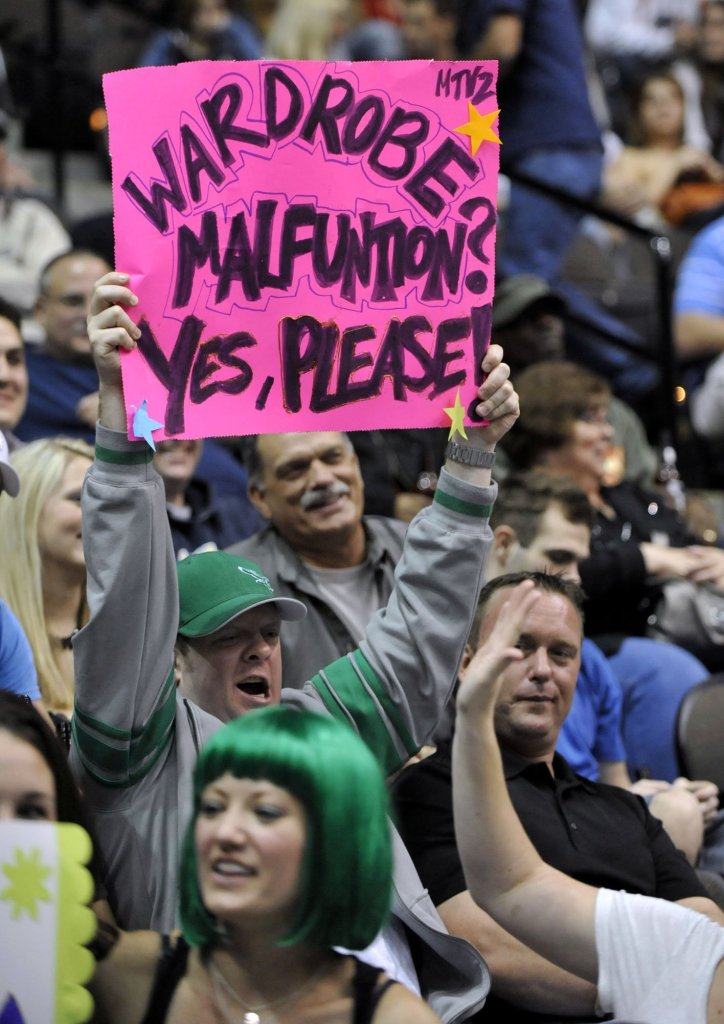
LFL fans clamor for a wardrobe malfunction…even if they can’t spell it.
Mitch Mortaza and LFL players and supporters defend the LFL’s uniforms, often comparing them with the uniforms worn by female athletes in beach volleyball, track, and swimming. It’s a faulty comparison on so many levels. First, LFL uniforms are much more revealing and show much more cleavage than most uniforms worn in those sports…rarely do players in those sports have to worry if “anything is going to pop out.” Second, those sports aren’t contact sports like football. Third, those sports don’t engage in the sexualized marketing the LFL does; as one former LFL player observed, “When we run track, they’re not taking boob- and butt-shots of us.” Fourth, the uniforms women wear in those sports are functionally similar to the uniforms the men wear…female swimmers aren’t given vastly different uniforms than male swimmers, while the LFL uniforms deviate from the uniforms male football players wear at all levels, solely for the purpose of sexualized marketing. Finally, those sports don’t have a commissioner telling players to lose weight before they can join a league, irrespective of their talent level…which is what makes those sports, well, actual sports.
The LFL has tried to re-position itself as a “family-friendly” enterprise in recent years, luring hundreds of women and children into the stands. Pretty.Strong. is part of that propaganda, with LFL players disgustingly trying to portray themselves as some kind of inspiration for young girls. Yet LFL players still engage in antics like twerking on an opponent’s head after a play, chugging a beer at midfield after a game, sipping a beer after scoring a touchdown, and making hand signals in the shape of a vagina after scoring plays. Family-friendly, all right…to the contrary, it’s all part of, as one site said (and pardon the language), the LFL’s “quest to be the favorite sport of douchebags.”
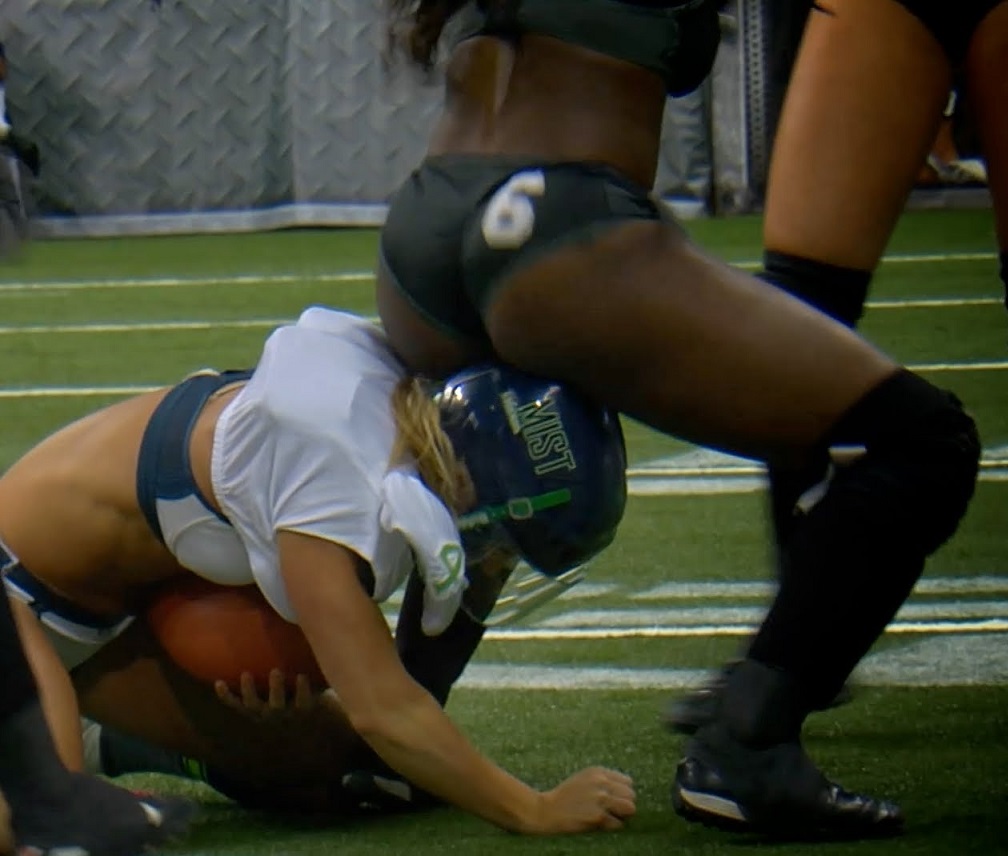
While the LFL is marketing this “sport” to children and grandmothers, players are celebrating tackles by twerking on their opponent’s head. Makes total sense.
Fixing the Game
For those who might still be under the impression this is somehow a competitive sport, consider that Mitch Mortaza’s despotic control of the league includes the ability to fix the outcomes of games. Mortaza has been known to show up on gameday and look over a team’s roster. If, in his expert opinion, he decides that a player isn’t up to his aesthetic standards, he orders the team’s coaches (who know they can be fired by Mortaza for any reason) to bench certain players just before kickoff. You can imagine how it would affect a team’s chances to win a game when they discover right before kickoff that several of their key players have been benched by the commissioner…a commissioner who often has a vested financial interest in who wins and loses.
Suffice it to say, there have been multiple “controversial” outcomes in the LFL’s short history. On December 30, 2011, the Orlando Fantasy played the Tampa Breeze with a playoff berth on the line. The Tampa team had much better ticket sales than the Orlando team, so Mortaza would financially benefit in seeing the Breeze come away with the victory and advance to the playoffs.
Tampa scored a touchdown in the final minute to defeat Orlando, 20-18. In truth, the win was assured thanks largely to what was widely reported as a slew of one-sided calls in Tampa’s favor by officials who report directly to Mortaza. Within days, the LFL “parted ways” with two staff members who covered the game, their color commentator and one of their unpaid staff writers.
The LFL then fired Orlando head coach Doug Miller for “blatant disrespect and unbecoming behavior.” Mortaza tried to use “league medical staff” (who also report to Mortaza) to pressure Coach Miller during the game to bench one of his best players…which, naturally, would have been a considerable advantage for Tampa. When Coach Miller refused, he was fired days later. As for the Orlando players, Mortaza retaliated against them by folding their entire team at the conclusion of the season.
Mitch Mortaza and Dion Lee
Dion Lee, the former coach of the LFL’s Las Vegas Sin, is one of the few former LFL coaches who has been willing to go on record about his LFL experience, given the league’s litigious nature. The LFL has sent numerous cease-and-desist letters to former players and even to media outlets that have published satirical articles about the league. Sometimes the harassment goes even further. One former LFL staff member, Justin Schoenrock, was met with a threatening phone call from a blocked number shortly after his departure from the LFL. Schoenrock said someone using a voice scrambling device attempted to blackmail him, warning him not to do any interviews unless he wanted to find his name and reputation smeared online.
Coach Lee came to the LFL with a solid track record as the head coach of the Las Vegas Showgirlz in traditional football. Lee’s experience in the LFL provides proof that, contrary to what some LFL players and supporters might suggest, the talent level in traditional women’s football is vastly superior to that of the LFL. The Showgirlz were a solid but not elite team in the traditional women’s game, but Lee managed to slip a few members of his Showgirlz team past Mortaza’s image-centric barricade and into the LFL. Armed with those players, Lee’s expansion team dominated the LFL, going undefeated in the regular season and earning the top seed in the playoffs.
Lee related a story about how his Las Vegas team played Mortaza’s beloved Los Angeles Temptation on November 11, 2011. Clinging to a late lead, Lee had his Vegas team run the ball in the hopes of running out the clock. Vegas held off the favored Temptation, 28-20, in a game the league titled as, “Hell Freezes Over.”
After the game, Mortaza came into the Las Vegas locker room. Lee was expecting to accept the commissioner’s congratulations, but instead, Mortaza ripped into Lee and his coaches for running the ball. “You should be running the two-minute offense!” Lee recalled Mortaza saying. Running the ball was the right football move, but Mortaza was angry over the lack of showmanship. Lee added, “He would say before every game, ‘People don’t come to see the girls play football. They come to be entertained.’”
Lee finally told Mortaza to get out of his locker room, and Mortaza responded by e-mail a few days later. “First, it is not your locker room nor your team,” Mortaza wrote. “Understand who I am and who you are, or you will have the shortest tenure in LFL history. Do not test me again if you wish to remain.” The LFL later passed a bizarre rule change, stating that teams must run twice and pass twice every four downs.
Lee went into detail about Mortaza’s micromanaging. “His hands are in everything. He’s trying to tell me how to run plays…sending me emails on how I need to run this reverse play,” Lee said. “He can tell anybody he wants anything.”
More Game-Fixing From Mortaza
Mitch Mortaza’s meddling with game officials surfaced once again when the Los Angeles Temptation and Las Vegas Sin had a rematch for the Western Conference championship on January 29, 2012. The conference championships were played as a double-header at Citizens Business Bank Arena, and the Las Vegas-Los Angeles tilt was scheduled to take place immediately following the Eastern Conference championship. But the first game ran late, so the Western Conference championship kickoff was delayed.
The undefeated Sin had rolled through the LFL regular season and earned the top seed in the playoffs. However, when the Las Vegas-Los Angeles game began, it became apparent that the officials were not going to call even the most blatant penalties. Late hits, unsportsmanlike conduct…the officials had swallowed their whistles. “Look at that game; there were no calls,” Lee said. “I called a timeout and chewed out the head ref. I said, ‘Why the heck are you not calling the personal fouls?’ [He responded,] ‘We’re not calling any fouls because we have limited time on the air. That’s from the head man.’”
By Lee’s account, Mitch Mortaza ordered the officials to move the game along because the first game ran long and he wanted to fit the doubleheader into a television window. More importantly, he again made sure his refs handed him his approved outcome; Los Angeles came away with an upset win over outspoken Lee’s Las Vegas squad. Following the game, Coach Lee was rewarded for taking an expansion team within a sliver of the Lingerie Bowl by being fired by Mortaza after just one season. Mitch Mortaza made the announcement, citing his dissatisfaction with Lee’s “poor guidance” of the team.
“No way in hell” was he going to let L.A. lose that playoff game, Lee alleged. It was no secret that the Los Angeles Temptation were Mitch Mortaza’s preferred team; Mortaza has been known to shed tears over playoff losses by the Temptation. Los Angeles’ third straight LFL championship enabled Mortaza to sell the public on their “dynasty status.”
Mortaza’s love for the Temptation was eventually trumped by money, however. Just this past season in the 2015 LFL Western Conference championship game, the Seattle Mist narrowly held off the Los Angeles Temptation after a questionable “official review” awarded them possession of the ball on a possible game-winning Temptation drive. The LFL championship game was already scheduled to be held in Seattle, and the victory by the Mist saved the league thousands of dollars; the LFL did not need to spend money on flights and hotels for the Los Angeles team, and the Seattle win assured the LFL of a much higher fan turnout with the local team participating.
Still think this is a real sports league?
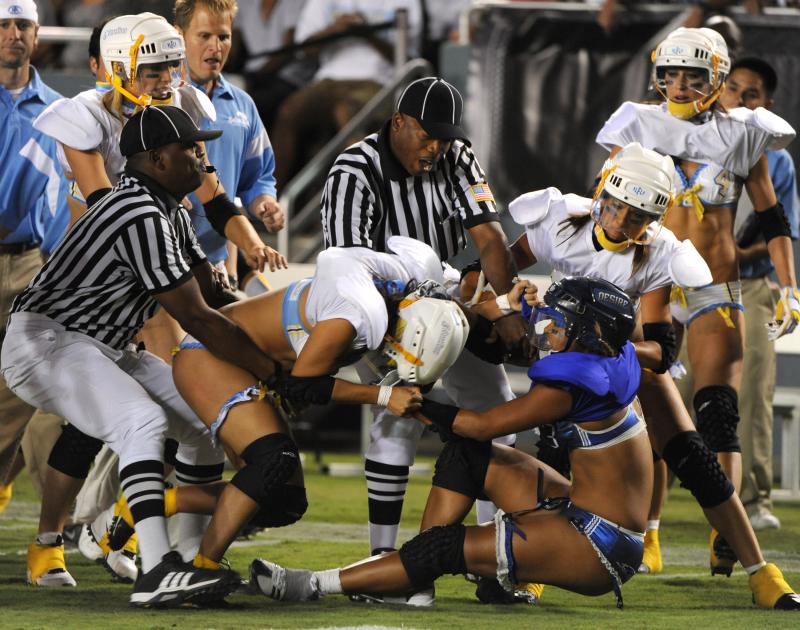
Like everyone else in the LFL, the league’s officials ultimately answer to Mitch Mortaza. Surprise, surprise…the team that benefits him financially usually wins.
Orchestrated Gimmicks
Mortaza is well-known for resorting to controversial gimmicks to drive even more attention to the LFL than the partial nudity already generates. Mortaza famously tried to start a youth division of the LFL, because, in his words, “younger and younger girls are starting to dream of playing LFL football.” He then contacted Michael Jackson’s daughter Paris to recruit her to head the project, a move one site correctly called “a bid to remain ever creepy.”
“What’s creepier than starting a youth league to prepare little girls to be lingerie football players?” the site continued. “Identifying the specific underage girls (children of celebrities, natch) that you’d like to see play in underwear one day!” Not surprisingly, Michael Jackson’s mother Katherine was furious at the proposition made toward her granddaughter. “Katherine views this as a disgusting attack on a minor,” a family friend said. “A teenage spokeswoman for a lingerie league? That’s just creepy and downright offensive.”
The LFL also obviously tries to draw (ludicrous) comparisons to the NFL whenever it can, naming its “film division” LFL Films, for instance. Mortaza loves to link his publicity stunts to the NFL as well: offering notably pious quarterback Tim Tebow an LFL coaching position, injecting himself into the Washington Redskins’ name controversy by taking the moral high ground in naming a proposed DC-based LFL team (which has yet to launch), and famously joining in the chorus of public criticism over the NFL’s replacement refs in 2012 by suggesting that they had fired some of them in the past (an allegation that garnered a lot of attention but which was never substantiated). Nothing substantive came out of any of these marketing ploys, but they were exactly the type attention-grabbing gimmicks the league has become known for.
Mortaza’s business gimmicks are fine until they go too far, of course. Amber Mane, who suffered a gruesome broken nose and collapsed at the arena, stated that her injuries were entirely preventable if not for the fact that Mitch Mortaza instructed her and other players to adjust their chin straps so they could rip off their helmets to celebrate plays. The league denies that account, even though it is corroborated by a former LFL assistant coach.
Melissa Margulies registered a quarterback sack in a game in 2010 and got up slowly, having suffered a concussion on the play. Mortaza had her immediately benched…not out of concern for her safety, but to punish her for not properly celebrating her sack. “You guys are boring to watch!” Mortaza told the team at halftime. “I had to bench Margulies because she didn’t celebrate a big tackle!”
Mortaza would then use Margulies as an example for years, telling players to “ask Margulies” if they didn’t think he was serious about being “entertainers” as much as athletes. The league denies that account, too, stating that only head coaches can decide to bench players. Once again, these head coaches report directly to Mortaza and can be fired for any reason if they don’t do exactly as he says.
Former players confessed that on-field fights among players were encouraged by the league to get the crowd riled up, and that those fights sometimes led to injuries. The LFL does seem to suffer from an inordinately large number of such incidents. In just one example, a brawl broke out this past season when a defensive player performed a push-up over the player she just tackled. “That’s unheard of in sports!” the announcer cracked. “But not in the LFL,” his sidekick retorted.
Kind of says it all, doesn’t it?
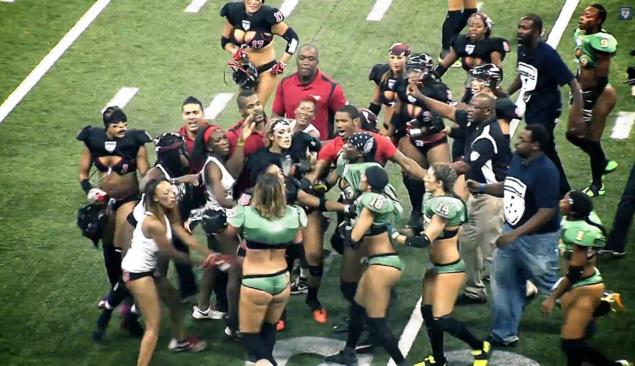
Here’s one benefit to wearing flimsy helmets: they inflict less damage when you swing them like a weapon in a fight, as LFL players have been known to do in the past.
One more time…if an LFL player does not do exactly as Mortaza instructs, she can be banned from the league for life for any reason at all. For Mortaza to pass off responsibility for these events is patently ridiculous. He controls every aspect of the league, yet he frequently uses players and coaches as a shield to deflect away from taking responsibility for his own lack of professionalism.
The Global Rejection of the LFL
Mitch Mortaza is peddling perhaps the easiest product to sell in the history of mankind – sex, violence, and a dash of faux-sport. In the hands of an astute businessperson, it would be a slam dunk. With Mortaza at the helm, however, the LFL has had more than its share of growing pains in its six-year history.
The LFL launched a league in Canada in 2012. After one season, the league collapsed with teams pulling out amid concerns over league disorganization and safety issues. Mortaza then insulted pretty much the entire country, stating, “We’ve never seen so many out-of-shape players in the off-season as we have on the rosters in Canada.” He also pledged to return in 2014 with six teams and an expanded schedule, promises that, naturally, went unfulfilled.
The LFL organized a league in Australia in 2013 amid considerable controversy. The national Minister of Sport, Kate Lundy, blasted the LFL and Mortaza for “hiding behind the guise of LFL being a ‘sport’.” Mortaza responded by comparing Australia to North Korea, an absurd comparison he already made when the mayor of Oklahoma City denied him an LFL franchise.
Regardless, the LFL lasted just one season in Australia, scrapping its planned second season two weeks before it was set to kick off. The Australians alleged they were owed $30,000 in payments when Mortaza left the continent and that they planned to organize a class action lawsuit in the United States to recoup the money. Though the LFL pledged to return to Australia in 2015, protests by former LFL players outside of a league tryout led to a paltry turnout of just six recruits, and the LFL abandoned the idea.
Mortaza also announced the launch an LFL league in Europe in 2014. The master plan was to have national teams from various international leagues compete in an LFL “World Bowl” in Brazil in 2014 during the World Cup. Mortaza confidently predicted anywhere from 30,000 to 50,000 fans for his event, which never took place.
As always, the LFL did its best to put a positive spin on their failings, announcing a new “global strategy” in 2015 that said, essentially, that their “primary focus” for the next few years would be on the development of the LFL in the U.S. It was a dramatic reversal from less than one year earlier, when the LFL vowed to surpass the WWE as a “commercial global sports property.” The refocusing of the LFL on the United States was little more than an admission of their total and unmitigated failure to expand the “sport” abroad.
Deck Chairs on the Titanic
Here in the United States, the LFL’s failures are evident. In just six short years, the league has either had teams “suspend operations” or announced plans for teams that failed to launch on time in the following major markets:
Miami, Orlando, Tampa (which was labeled as a “relocation” to Jacksonville), Jacksonville, Charlotte, Baltimore, D.C., New York, Boston, Pittsburgh, Philadelphia, Cleveland (which was labeled as a “relocation” to Toledo), Toledo, Green Bay, Milwaukee, Minneapolis, St. Louis, Nashville, Oklahoma City, Tulsa (which actually pre-emptively shot down the idea), Dallas, Houston, Denver, and San Diego.
The LFL has announced expectations to have 26 teams in the league within five years. Yet in 2015, the LFL featured just six teams in five markets, with the Las Vegas franchise “temporarily” operating out of Los Angeles. As always, the league continues to unveil aggressive expansion plans, but history shows that LFL franchises last fewer than seven games on average before folding.
The LFL recently defaulted in a May 2015 lawsuit in Las Vegas. Mortaza has also refused to respond to or offer any type of defense against a similar lawsuit in California, which may also be headed toward a default judgment against him. Meanwhile, Mortaza has attempted to evade being served with legal papers, going so far as to deny his identity at a recent tryout despite several women identifying him as Mortaza.
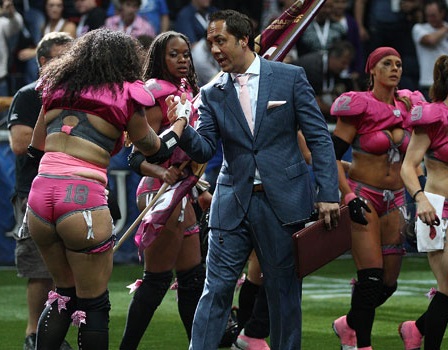
As a public service announcement for all you attorneys out there wanting to serve him with legal papers, this is Mitch Mortaza. Again, this is Mitch Mortaza. Thank you.
Mortaza’s ego demands that he will forever remain the LFL’s supreme tyrant, incapable of being overruled. Creating a new level of front office staff would simply be another way for Mortaza to deflect responsibility for what happens in his league onto someone else, as he now does with his players and coaches. You can fully envision a day when some poor pawn inherits the job as LFL Commissioner, with Mortaza retaining his role as “Founder”, of course. Then anyone questioning Mortaza’s tactics will be told, “The commissioner makes those decisions,” when, in fact, said commissioner is fully subordinate to Mortaza’s commands and serves at his leisure.
The End of the LFL
It’s not hard to foresee the eventual end of the LFL. Regardless of who runs the league, the safety concerns will never truly go away; the lack of proper safety equipment will likely bring LFL to its knees sooner or later. Mortaza has repeatedly justified the use of hockey helmets, saying they are superior to traditional helmets, which tend to be “used as a weapon.” But at least one prominent doctor has labeled that assertion “absurd,” predicting “skull fractures and deaths.” While some doctors could envision a day where legitimate men’s football players cease wearing helmets altogether, such a move would need to be accompanied by drastic rule changes as well. “If there were no helmets and the game was played the way it is today, a lot of people would be dead on day one,” one prominent brain trauma researcher noted.
Evidence would seem to be on the side of the medical establishment rather than Mitch Mortaza on the safety issue. The way football is currently played, less protection is dangerous, and Mortaza’s assertions to the contrary are clearly warped by his profit motive. The LFL’s history of severe injuries has been well-documented, and it’s only a matter of time before some ill-equipped player is catastrophically injured, paralyzed, or killed playing in the LFL. And that will be the end of it.
In the meantime, the arenas that host LFL contests would be well-advised to make sure their insurance policies are up-to-date, because when that time comes, the victims won’t be coming after Mortaza – who, despite his claims, probably has little money to give them. When a player is tragically hurt or killed during an LFL game – and wearing those uniforms, it will happen – it’s the arenas who will be on the hook. They’ll be the ones liable for turning a blind eye to the numerous horrifying injuries that have already occurred to LFL players wearing clearly substandard equipment, all with the expressed intention of driving up ticket sales. Arenas ignoring the LFL’s appalling track record with respect to safety will have the LFL’s blood, quite literally, on their hands as well.
The Alternative to the LFL
Yet despite all the baggage dragging down the LFL in little over a half-decade of existence, the Oxygen network – backed by NBC Universal – is rushing headlong into an ill-guided attempt to legitimize the LFL by highlighting the great “character stories” of the league’s players in its new reality show, Pretty.Strong. On some level, I actually get that. As a staff writer for a traditional women’s football team and a commentator on the sport of women’s football as a whole, I find myself tethered to the sport largely due to my fascination for the compelling personal stories of the athletes involved.
Yet you can’t help but shake your head when you hear Emily Kaplan, for instance, call Nas Johnson, the cop-by-day, lingerie football player-by-night of the LFL’s Atlanta Steam, a “fascinating character.” Kenyetta Grigsby is one of the greatest running backs in (real) women’s football, with 7,000 career rushing yards and over 100 touchdowns in her 12-year career. By day, she is – surprise, surprise – a police officer. Grigsby balances her career in law enforcement with working out, attending practices, dissecting film…all so she can carry out her dream of playing football.
What, then, is the difference between Nas Johnson and Kenyetta Grigsby? Kaplan explained the LFL players’ motivation by saying, “This is the only opportunity they’ve found that they can play with high exposure.” I truly hope Kaplan appreciates her double entendre…essentially, LFL players like Johnson trade exposure for exposure. LFL players expose copious amounts of skin in exchange for the exposure of playing to crowds of 2,000 as opposed to 200.
Is that laudable, though? Why are we suggesting that it’s somehow noble to acquiesce to playing in bikinis in an inherently unsafe environment for the profit of a sleezebag, all solely for the sake of a little fleeting fame? Let’s be clear…I’m not scolding the women for making that choice. But shouldn’t we as a society – and Oxygen as a network – recognize that Grigsby’s path is MORE honorable?

So just to recap: This is real women’s football, the female equivalent of the popular sport men play…
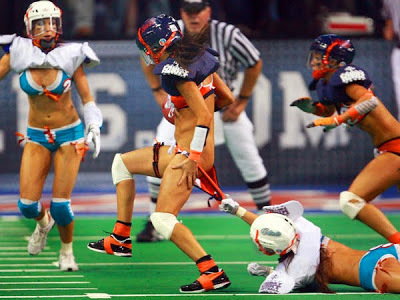
…and this is lingerie football, a glorified peep show and not an actual sport. Can you see the difference now?
But if Aissa’s looking for “aspirational” stories, traditional women’s football has no shortage of them. How about Allyson Hamlin, who juggles duties as a quarterback with being a homicide detective? What about Sharon Vasquez, who bounces between being an elite football player, raising three kids, and keeping heart patients equipped with lifesaving technology? And nearly everyone in the sports world now knows about Jen Welter, who became the first female coach in NFL history after a long career playing real, honest-to-goodness football with the Dallas Diamonds. Why not produce a show highlighting their sport – which, as a bonus, is an actual sport, not a spectacle where outcomes can be fixed at the whim of a commissioner’s profits?
Rather than go that route, Oxygen has decided to reward the LFL with a reality show. Aissa – and many others like him – have been so blinded by the admirable attributes of some of the LFL’s players that they’ve naively decided to promote an operation that is rotten to its core. By promoting the LFL, they are lining Mortaza’s pockets and giving him more ammunition to use to lure wide-eyed recruits into his web of exploitation and abuse. Aissa justifies this decision by commending the LFL’s efforts to defy “social norms.” After reading how Mitch Mortaza hides behind these female athletes for his own profit and considering the needlessly dangerous environment in which these women play, it should be apparent that some social norms are norms for a reason.
